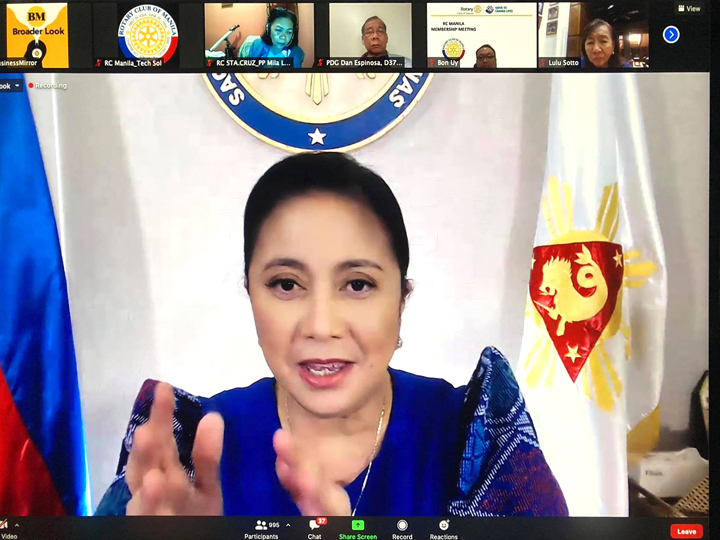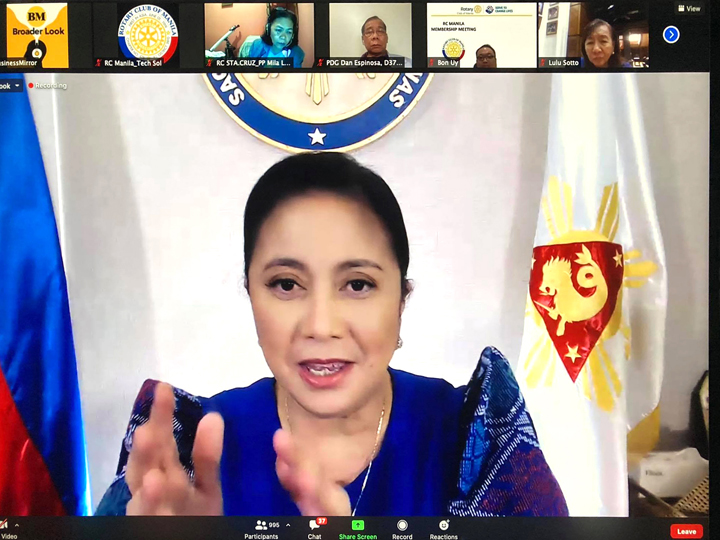
VICE President and 2022 presidential candidate Leni Robredo said if she gets elected, the Philippine government will not enter into any deal with China involving the West Philippine Sea (WPS) without the latter’s recognition of the 2016 arbitral tribunal ruling in The Hague which upheld the country’s sovereign rights in areas within its 200-nautical mile exclusive economic zone.
Robredo made known her stance on the controversial issue as well on other issues confronting her bid for the 2022 presidential elections during the 16thMembership Meeting of the Rotary Club of Manila for 2021 and 2022 where she was invited as guest speaker. It was the prestigious organization’s Inaugural Presidential Forum.
The vice president echoed President Duterte’s independent foreign policy, but insisted that relations with neighboring countries and allies should be strengthened at the same time.
“It has always been more beneficial to us to have an inclusive and independent foreign policy as opposed to one which favors specific countries.
But that being said, for China we will collaborate with them for the areas that we will have no conflict such as trade and investment much like Vietnam has been doing; but when it comes to the West Philippine Sea we cannot deal with them without their recognition of the arbitral ruling,” Robredo said.
Any agreement for joint exploration of the WPS, according to Robredo, would depend on China’s willingness to accept the arbitral ruling.
Robredo also said the country’s good relations with long-time ally, the United States, should be strengthened for the welfare of the Filipinos working and living there.
“We also need to strengthen our diplomatic relations with our other allies, the Asean [Association of South East Asian Nation] countries, the European Union, Great Britain, Australia and in countries where there a large concentration of OFWs [overseas Filipino workers],” Robredo said.
“We will do all we can to cement bilateral agreements with them to ensure the protection of Filipinos and ensure satisfactory labor conditions for them. We will be open to working with everyone so long as it is to the best interest of the Filipino people,” she stressed.
On the issue of food security, Robredo said agriculture will be one of the top priorities of her administration if she wins the election next year.
“Our goal now is to make sure that this health crisis does not turn into a food crisis so we need to invest heavily in the agriculture sector, particularly on the technology and farm to market infrastructure,” Robredo said.
She said she would strengthen government support and subsidies to farmers in order to bring down the prices of basic commodities, particularly rice.
The Vice President stressed the need to institutionalize regular consultation and stakeholder representation and participation in planning, implementation and monitoring of programs intended to uplift the lives of farmers.
“According to the Agriculture and Fisheries Modernization Act, there should be consultation with stakeholders but when you talk to them they would always say it has never happened,” Robredo noted.
“I will also help to empower and capacitate our farmers and fisherfolks. We can do this by building all the necessary infrastructure, farm to market roads, installing shared service facilities, they also must be given access to technology so they can modernize, skill up and speed up their operations,” she added.
When asked what she would do during the first six months of her presidency to provide jobs for the millions of Filipinos who lost their jobs during the pandemic, Robredo said what she could promise is that her administration would inspire confidence for the business sector.
It is also important to control the spread of the Covid-19 virus in order for businesses to be able to fully open anew, she stressed.
“It is very difficult to over-promise but one thing that will bring jobs back is to make sure that the pandemic is under control,” Robredo said.
On the other hand, to address the graft and corruption problem in the government, Robredo said it is important to promote accountability, transparency and people empowerment.
She said there should be systems in place to ensure that officials are accountable.
Robredo said the concept of direct people’s participation in governance has been very successful in her hometown in Naga City.
“A people’s council was formed…a platform where they can directly participate in planning, evaluating projects, budgets are not passed before they are presented to the people’s council,” she explained.
Robredo also likened the current state of government to the situation in 1986, when the Marcoses fled the country during the Edsa People Power 1.
“As I have said, this is a very different time in the history of our country in a sense it’s like 1986, that there are a lot of institutions to be fixed. The last five and a half years we have seen the weakening of institutions, so a lot of focus will be on governance, a lot of focus will be on fixing the kind of politics that we have,” she stressed.
Asked how she would be different from other past presidents, particularly the country’s two former women presidents, Gloria Macapagal-Arroyo and the late Corazon Aquino, Robredo said being a decisive leader has nothing to do with gender.
“For an efficient government is a government that gets the job done and that’s exactly what we have shown at the OVP and what we are set to do,” Robredo said.
She noted that several women leaders—New Zealand Prime Minister Jacinda Ardern, Taiwan President Tsai Ing-Wen and Chancellor of Germany Angela Merkel—managed to show strong leadership amid the obstacles brought by the Covid-19 pandemic.
“All of them are being recognized for the speed and effectiveness of their leadership in the time of Covid. They are rising to the occasion, finding ways around obstacles, quickly adapting to the crisis, finding ways to implement policies and communicate vital information about the virus,” Robredo pointed out.
Her being collaborative also bears pointing out, “because it’s easy to equate being a strong and decisive leader with brashness and aggression, with a loud and domineering style of leadership, but for me that kind of leadership more often than not disempowers and frightens others into silence,” she added.

